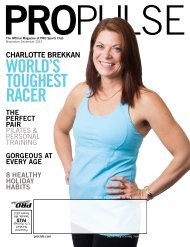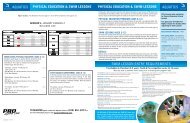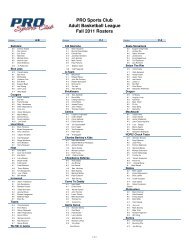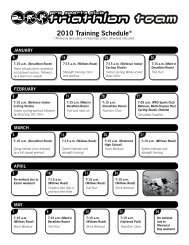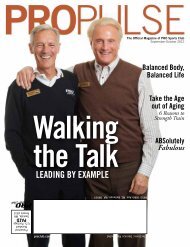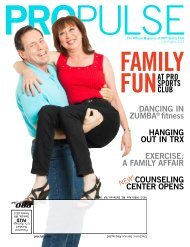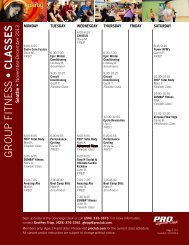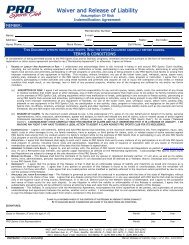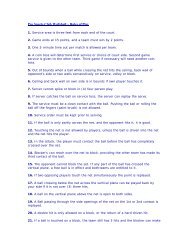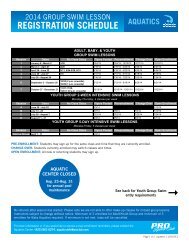online edition - PRO Sports Club
online edition - PRO Sports Club
online edition - PRO Sports Club
- No tags were found...
You also want an ePaper? Increase the reach of your titles
YUMPU automatically turns print PDFs into web optimized ePapers that Google loves.
science pulseBy James Krieger, M.S., M.S., ACSM-HFILow Fat ConfusionYou may have seen it all over the headlines earlier this year. ”StudyFinds Low-Fat Diet Won’t Stop Cancer” was the headline in the NewYork Times. The study that is being referred to is Women’s HealthInitiative (WHI), a government-sponsored study involving more than48,000 women at a cost of $415 million. 2 The study was intended tolook at the affect of a low-fat diet on breast cancer risk. Let’s take acloser look at it.The Study: Women between the ages of 50-79 were recruited for thisstudy. One group was put on a low-fat diet where they received dietarycounseling. The counseling was intensive for the first year and tapered offafter that. The goal was to get 20% of calories from fat. The comparisongroup ate what they wanted. The women were followed for eight yearsand the researchers looked at the incidence of breast cancer.The Results: Statistically, there was no significant difference in breastcancer risk between the groups. This led many people to quickly jumpto the conclusion that decreasing intake of fatty foods would not helpprevent cancer. However, a closer look at this study reveals that the riskof breast cancer was 9% lower in the women on the low-fat diet. Thisdifference was on the borderline of being statistically significant. So,there was a definite trend towards a benefit of reducing fat intake. Infact, the women in the low-fat group who started out eating the most fatat the beginning of the study (at least 37% of calories) experienced a22% lower risk of breast cancer than women who continued with theirnormal diets.Breast Cancer is a disease that many women mayhave to face in their lifetime. In fact, breast cancer isthe most frequently diagnosed cancer among women.Luckily, there are things that you can do to help loweryour risk. Scientists are always busy trying to find outhow lifestyle affects breast cancer risk. Let’s look atsome of their recent findings.Exercise isn’t just good for your heartJust in case you didn’t have enough reasons to exercise, scientists have found youanother one.The Study: Researchers looked at 1,001 breast cancer patients from Shanghai,China, and compared them to 1,556 age-matched controls. 1 The researchersexamined how physical activity levels related to risk of developing breast cancer.The Results: Leisure-time physical activity during adolescence and during theprevious 10 years was associated with a 48% decrease in risk of breast cancer inpre-menopausal women and a 63% decrease in risk in post-menopausal women.Sweating during exercise was also associated with a decreased risk.Bottom Line: Make sure you’re exercising regularly and you will decrease your riskof breast cancer. Also, make sure that the intensity of your exercise is high enoughso that you break a sweat.Another important factor to consider is that very few women cut as muchfat they were directed to. The women got 24% of their calories from fatthe first year, and by six years were getting 29% of their calories fromfat. So, the goal fat intake of the study was never reached. Also, sincefood intake was self-reported, fat intake may have been even higher, asself-reporting can be an unreliable estimate of what people are reallyeating. Finally, the low-fat diet did not differentiate between “good” fats(unsaturated fats and omega-3 fatty acids) and “bad” fats (saturatedfats and trans fatty acids). This study was designed in the early 1990’swhen there was still a focus on eating low-fat diets. Since then, nutritionrecommendations have changed; no longer is total fat as much of aconcern as the type of fat that you eat. Given all of these factors, wecannot take this study to mean that lowering fat intake (particularly“bad” fats) will not improve your risk of breast cancer.Bottom Line: More research will be needed to tease out the effects ofdietary fat and breast cancer. However, it’s still clear that we shouldall continue to avoid saturated and hydrogenated fats and concentrateon healthy fats such as olive oil, canola oil, and fish oil. As far as anappropriate percentage of your calories from fat, this may vary dependingupon your individual needs, but will typically rangeanywhere from 20-35% of your calories. Talkwith one of our registered dietitians who willhelp you find out what is right for you.References:1. Adams, S., et al. Association of physical activity withhormone receptor status: the Shanghai Breast Cancer Study.Cancer Epidemiology, Biomarkers and Prevention15:117-1178, 2006.2. Prentice, R.L., et al.. Low-fat dietary patternsand risk of invasive breast cancer: The Women’sHealth Initiative Randomized Controlled DietaryModification Trial Journal of the AmericanMedical Association 295:629-642, 2006.34 <strong>PRO</strong> PULSE SEPTEMBER-OCTOBER 2006



